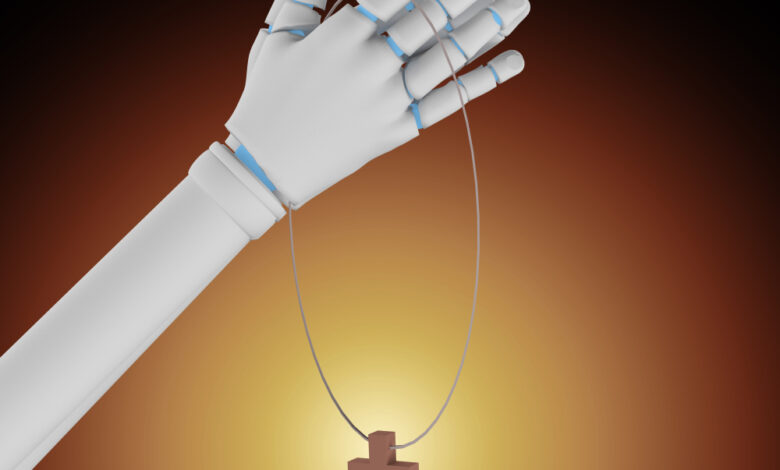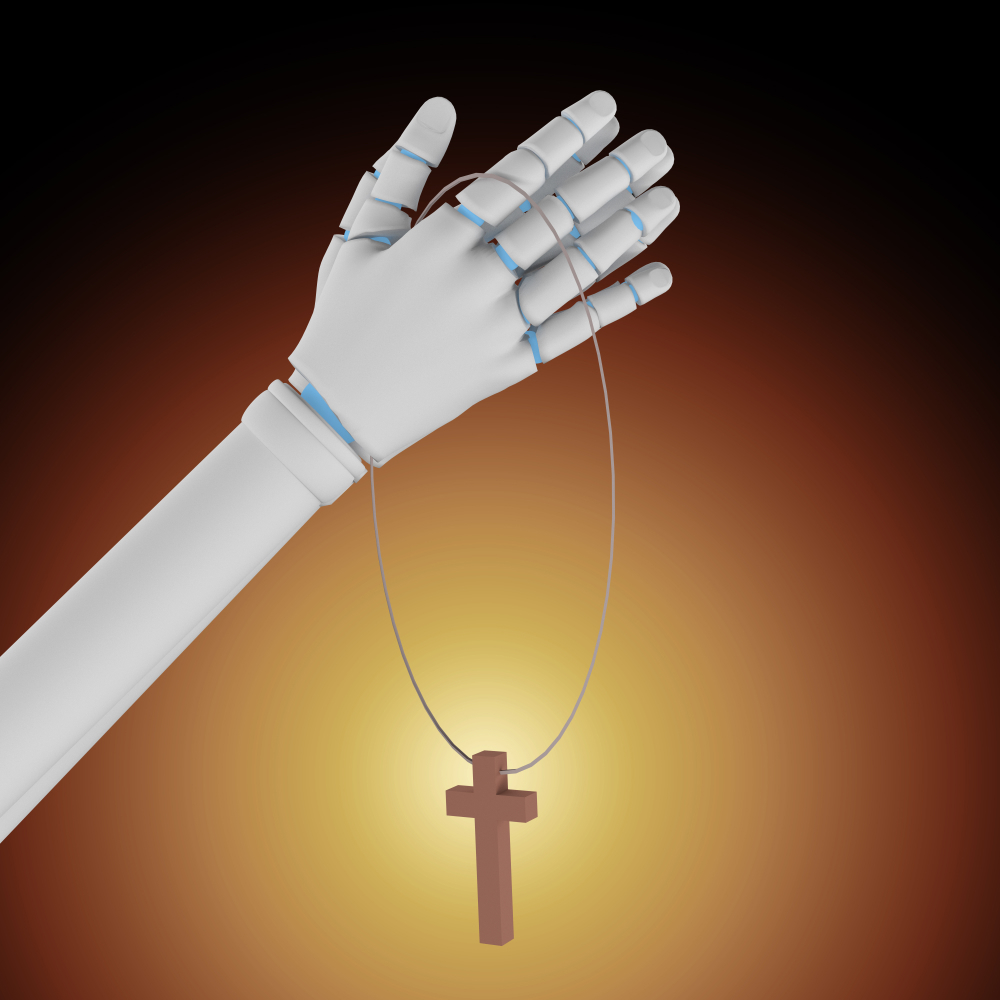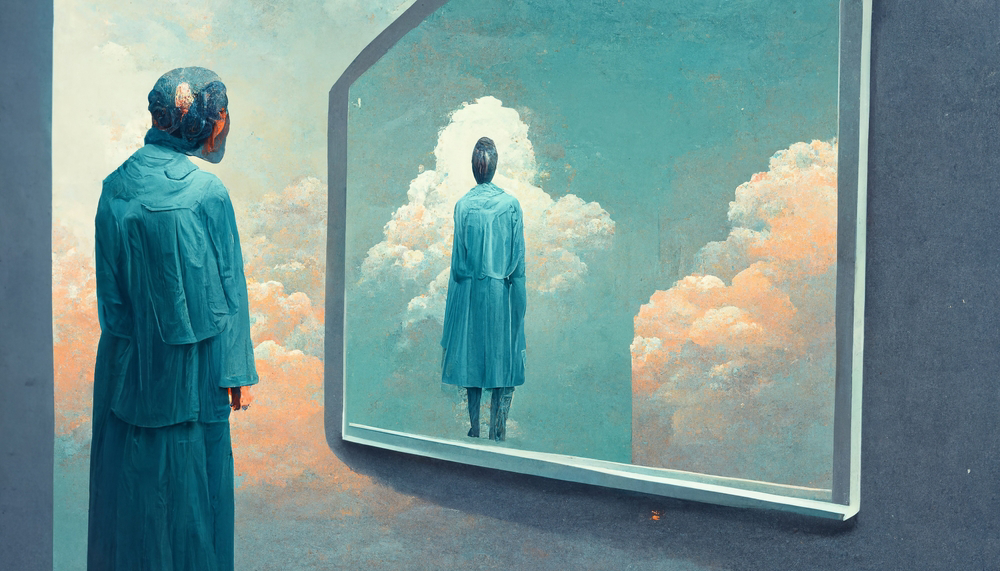AI Robots May Be Leading Religious Worship Services Better Than Humans Do

ChatGPT and the other artificial intelligence chatbots which have taken the world by storm in just a few short months have scared many users and AI observers with their sometimes violent, racist and apocalyptic comments. This comes as many humans begin to ponder whether AI, especially when incorporated into a robot, can be sentient and should be treated like a human – protected by laws and treated with the kind of respect reserved for human beings. If a robot has a conscience, does that mean it has a soul? While some say no, others are giving these intelligent robots spiritual tasks – leading worship services, giving sermons and even leading congregations in prayer. This has often been used in shortage situations where priests or ministers are not available. A recent paper asks the next logical question: What will happen if these devotion robots became better at the job that the humans they are rep[lacing? Can a human be ‘saved’ by a robot? Will the congregations push out human spiritual leaders in favor of religious robots? What happens if the robots appear to be worshiping human gods? What happens when the first religious chatbot invites humans to worship a robot god? Should fear or misunderstanding cause humans to shut down robots which are actually making them into better humans? Is it too early to be thinking about this? Or too late?

“As an anthropologist who specializes in religion, however, I focus less on the theology of robotics and more on what people actually say and do when it comes to their spiritual practices. My current work on religious robots primarily centers on the notion of “divine object-persons,” where otherwise inanimate things are viewed as having a living, conscious essence.”
Holly Walters is a Visiting Lecturer in Anthropology at Wellesley College. In her article published in The Conversation, she looks at a job that most people would assume could never be taken over from humans by robots or artificial intelligence – priests, monitors, shamans, spiritual leaders and other ritual-performing jobs. She focuses on Hinduism and Buddhism as those religions seem to have turned to automation earlier than others, possibly because so many rituals of South Asian religions are connected to moving objects – from special pots that drip water continuously for Hindu bathing rituals to wind-powered Buddhist prayer wheels. Walters says that many Hindus and Buddhists eagerly accept automation as progress for the betterment of their religions. Other have the opposite reaction.
“In other cases, there are concerns that the proliferation of robots might lead to greater numbers of people leaving religious practice as temples begin to rely more on automation than on practitioners to care for their deities.”
These people are concerned about the robot prayer readers and service leaders for a very surprising reason – these ‘leaders’ are perfect. They always perform the ritual exactly is it is supposed to be. They never miss a word or phrase in prayer … or read the wrong one. In other words, when it comes to “orthopraxy” – the correct process of worship – the robots are better than priests. Walters points out that if the congregation sees ritual correctness – not spiritual beliefs – as the way to acceptance or salvation, congregations will follow the leaders who do them perfectly … the robots.
“It tells us that Hinduism, Buddhism and other religions in South Asia are increasingly being imagined as post- or transhuman: deploying technological ingenuity to transcend human weaknesses because robots don’t get tired, forget what they’re supposed to say, fall asleep or leave.”
If humans expect their religious leaders to transcend human weaknesses, some may see that as avoiding ‘sin’. That could be a problem in the Catholic and Protestant religions these days when priests and ministers have been revealed to commit various levels of ‘sins of the flesh’. If robots don’t have sex, they’ll never commit these sins of sex. Could humans who accept robots as religious leaders see this as ‘leading by example’ and follow robots instead of imperfect priests and ministers? That day may already be here.
“A robotic priest that delivers sermons, gives advice and accompanies the faithful in prayer has been introduced to Poland. The brainchild of Gabriele Trovato from Tokyo’s Waseda University, the robot named SanTO has been a year in the making and is now being trialed in the capital Warsaw.”
The First News reported in 2021 that Poland, a nation that is almost 100 percent Catholic, has a robotic priest taking over many of the functions of priests. While this was introduced during the pandemic, SanTO is still working. For Lutherans, a robot called BlessU-2 was introduced in Germany – it can preach in German, English, French, Spanish and Polish. A digital rabbi is in the works, and Muslims around the world are downloading prayer apps.
“Robots are programmed and are incapable of having a will and an intellect or an interior prayer life of their own.”
Sister Mary Christa Nutt, RSM, explained to the Catholic News Agency why she thinks robots can’t become priests – they don’t have a will or an intellect of their own. That may be true, but it may also be difficult to prove, as the recent discussions with chatbots show. And does that really matter? What if a congregation decides for itself than their robot priest has an intellect and a will? If it guides them down the ‘proper’ path, doesn’t that make it a religious leader?
Of course, if a congregation can convince itself that a robot is a priest, it could also convince itself that a robot is a god. Again, that may already have happened. In Kyoto, Japan, the 400-year-old Buddhist temple of Kodaiji has a robotic priest named Mindar, whose ‘face’ is based on Kannon, the goddess of Mercy in the Buddhist faith. Could this convince some Buddhists that the robot is indeed a god … especially if they like the preaching and advice Mindar gives?
“Should the self-thinking machines need to attend church, sing hymns and care for the poor? Can the electronic person sin and should s/he receive sacraments?”

The Union of Catholic Asian News is already asking the questions as Christian Asians are seeing how their Buddhist friends are adapting to robot religious leaders. If a robot priest is better than the real deal, should it get the benefits of human priests, like receiving communion or even a place in the afterlife? Holly Walters concludes her article in The Conversation with a ray of hope.
“Modern robotics might then feel like a particular kind of cultural paradox, where the best kind of religion is the one that eventually involves no humans at all. But in this circularity of humans creating robots, robots becoming gods, and gods becoming human, we’ve only managed to, once again, re-imagine ourselves.”
What are these AI robotic religious leaders leading humans to re-imagine themselves to be? Should they be followed … or turned off?
Or is it too late?



